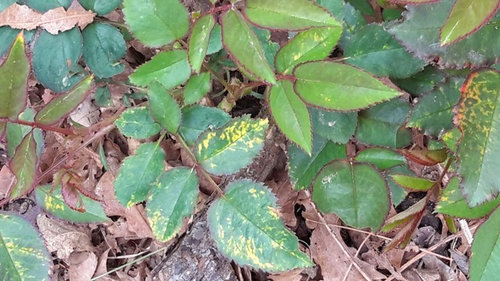Is this RMV?
poppy_pa_6b
9 years ago
More Discussions
Hi,
I'm new to this forum and fairly new to roses. I would really appreciate opinions if this is RMV.
This is a Darcey Bussell that my niece picked up end of season and not very vigorous that I've been trying to get established for 2yrs. This is the first year the foliage is really taking off and it now is exhibiting this new issue.
I have read numerous other posts regarding RMV and would like to leave the rose in the garden, but am so struggling to balance my rose care between basic feeding options, spray/no spray options, wildlife(deer/rabbits/groundhogs), blackspot, aphids, Japanese beetles, sawfly larvae etc etc etc... that I'm not looking for one more issue that could harm nearby newly planted DA roses.
That said... RMV? Yea? Nay?
I so appreciate your input!
Thank you,
Ann
p.s. I'm just now noticing in the pic something's been nibbling on the leaves and this rose has fencing around it and I used dormant spray for the first time this year.... oy vey!



hoovb zone 9 sunset 23
dublinbay z6 (KS)
Related Professionals
West Chester Landscape Architects & Landscape Designers · Winder Landscape Architects & Landscape Designers · Elgin Landscape Contractors · Tempe Landscape Contractors · Surprise Landscape Contractors · Wilmington Landscape Contractors · Annandale Landscape Contractors · Berwyn Landscape Contractors · Dallas Landscape Contractors · Dedham Landscape Contractors · Fort Atkinson Landscape Contractors · Fort Payne Landscape Contractors · Mastic Beach Landscape Contractors · Santa Ana Landscape Contractors · Wareham Landscape Contractorsseil zone 6b MI
Maryl (Okla. Zone 7a)
henry_kuska
seil zone 6b MI
Kippy
poppy_pa_6bOriginal Author
dublinbay z6 (KS)
User
Kippy
Maryl (Okla. Zone 7a)
User
henry_kuska
henry_kuska
poppy_pa_6bOriginal Author